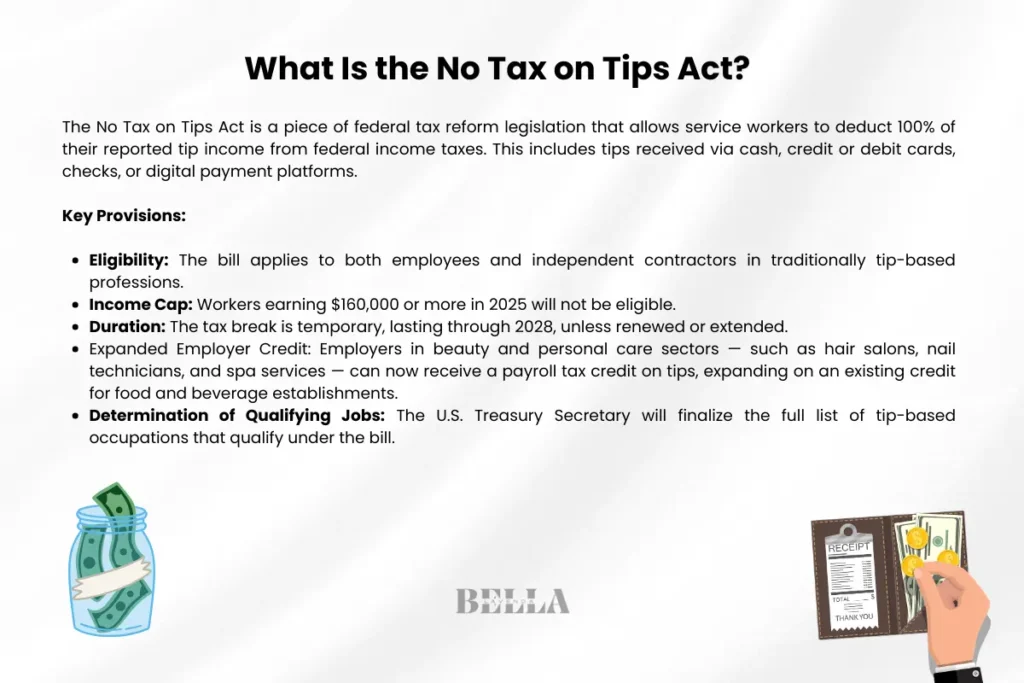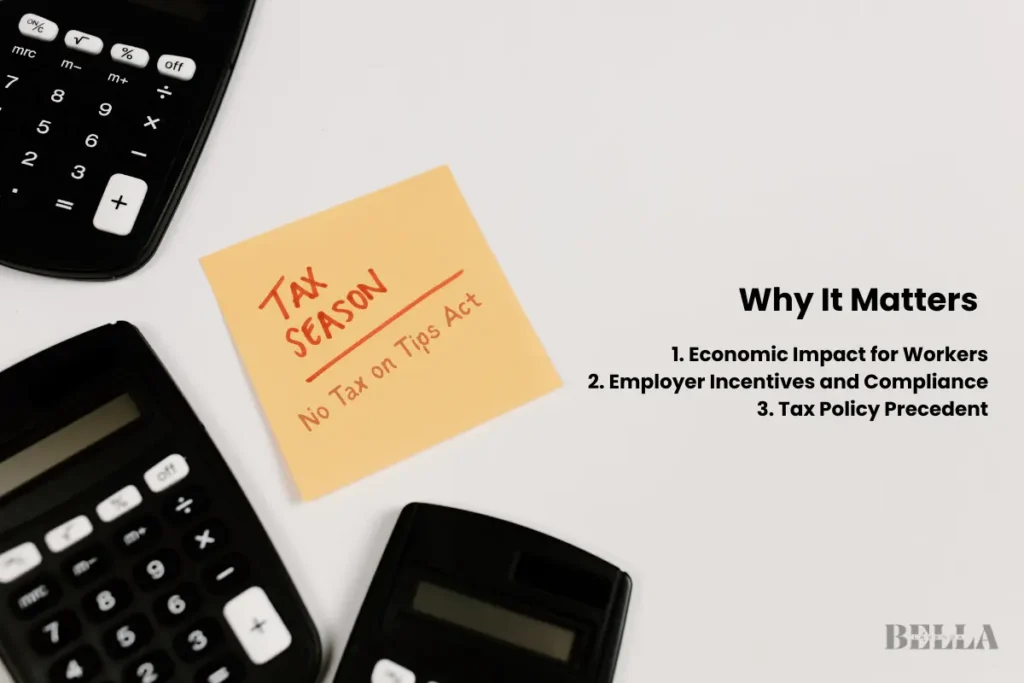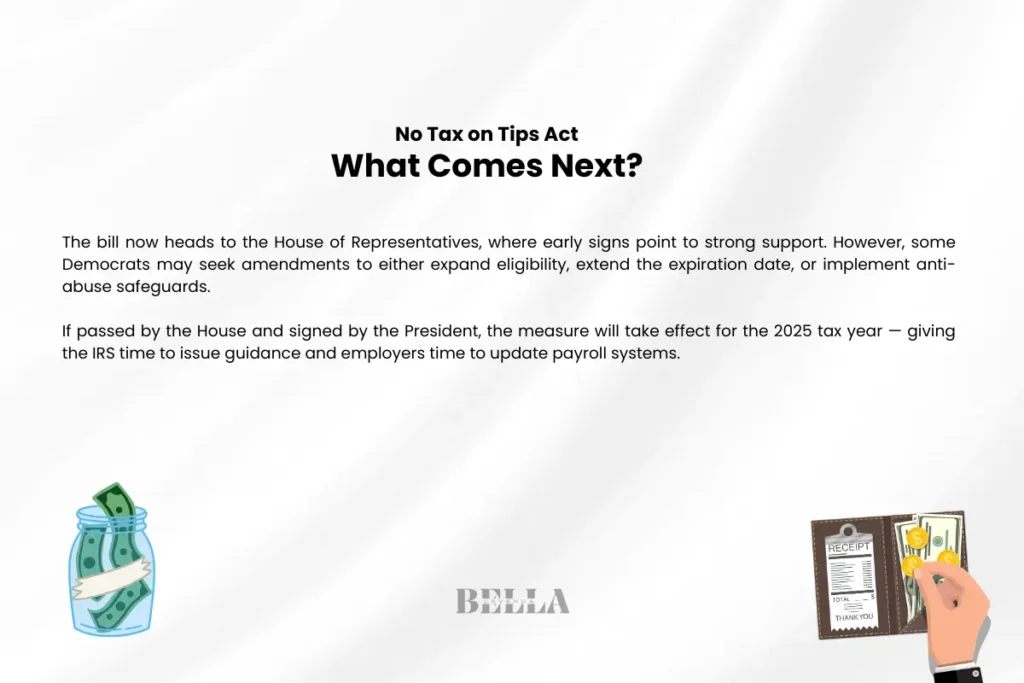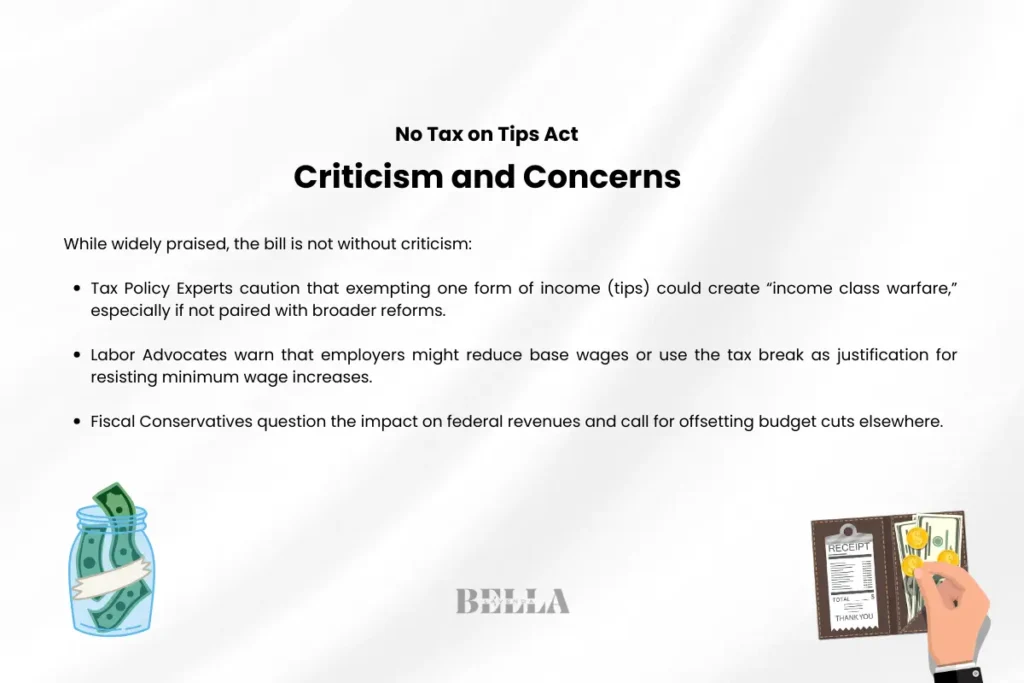In an increasingly rare display of bipartisan cooperation, the U.S. Senate unanimously passed the No Tax on Tips Act, championed by former President Donald Trump and introduced by Senator Ted Cruz (R-Texas). The legislation cleared the Senate with a 100-0 vote, signaling broad-based support across the political spectrum for a measure aimed squarely at alleviating the tax burden on service industry workers.
As it awaits action in the House of Representatives, this article breaks down what the bill means, who it affects, and the broader implications for tax policy and labor economics in the United States.
What Is the No Tax on Tips Act?

The No Tax on Tips Act is a piece of federal tax reform legislation that allows service workers to deduct 100% of their reported tip income from federal income taxes. This includes tips received via cash, credit or debit cards, checks, or digital payment platforms.
Key Provisions:
- Eligibility: The bill applies to both employees and independent contractors in traditionally tip-based professions.
- Income Cap: Workers earning $160,000 or more in 2025 will not be eligible.
- Duration: The tax break is temporary, lasting through 2028, unless renewed or extended.
- Expanded Employer Credit: Employers in beauty and personal care sectors — such as hair salons, nail technicians, and spa services — can now receive a payroll tax credit on tips, expanding on an existing credit for food and beverage establishments.
- Determination of Qualifying Jobs: The U.S. Treasury Secretary will finalize the full list of tip-based occupations that qualify under the bill.
A Promise Delivered by Trump
The act fulfills a campaign promise by Donald Trump to eliminate federal taxes on tipped income — a move aimed at bolstering the incomes of hourly wage workers and service professionals, many of whom rely heavily on gratuities to supplement low base wages.
“This is about economic dignity,” Trump said at a recent rally, framing the bill as a populist measure targeting working-class Americans who often live paycheck to paycheck. The legislation forms part of a broader narrative from Trump and allied Republicans seeking to distinguish their economic platform from that of the Biden administration ahead of the 2024 election cycle.
Legislative Backing and Bipartisanship
While the bill was introduced by Senator Cruz and heavily promoted by Republican leadership, it garnered robust bipartisan support — particularly from Democratic senators representing states with large service economies.
Key Advocates:
- Senator Ted Cruz (R-TX): “This legislation will have a lasting impact on millions of Americans by protecting the hard-earned dollars of blue-collar workers.”
- Senators Jacky Rosen and Catherine Cortez Masto (D-NV): Nevada, a state with a high concentration of tipped workers in the hospitality industry, played a central role in pushing the legislation through.
Even Senate Minority Leader Chuck Schumer (D-NY) offered conditional support:
“Working Americans — from servers to bartenders and delivery drivers — deserve this relief. It’s the ultra-rich who should be paying more, not those scraping to get by.”
Advertisement
This united front, particularly on tax policy, is seen as a notable shift from the usual partisan gridlock that typifies Capitol Hill debates.
Why It Matters

1. Economic Impact for Workers
The elimination of federal income taxes on tips will provide meaningful financial relief to millions of workers in industries like:
- Restaurants and cafes
- Hotels and hospitality services
- Hair salons, barber shops, and spas
- Rideshare and delivery platforms
According to estimates, the average tipped worker in the U.S. earns between $4,000 and $12,000 annually in gratuities, depending on occupation and location. Exempting this income from taxation could result in thousands of dollars in annual savings for many individuals.
2. Employer Incentives and Compliance
The employer-side credit is an important addition, offering financial incentives to accurately report tips and remain compliant with wage and tax laws — something that has been historically under-reported across many small businesses.
3. Tax Policy Precedent
The No Tax on Tips Act could serve as a blueprint for targeted, income-specific tax relief, potentially laying the groundwork for similar future legislation aimed at other low- and middle-income earners. However, critics worry about the growing complexity and fragmentation of the tax code.
What Comes Next?

The bill now heads to the House of Representatives, where early signs point to strong support. However, some Democrats may seek amendments to either expand eligibility, extend the expiration date, or implement anti-abuse safeguards.
If passed by the House and signed by the President, the measure will take effect for the 2025 tax year — giving the IRS time to issue guidance and employers time to update payroll systems.
Criticism and Concerns

While widely praised, the bill is not without criticism:
- Tax Policy Experts caution that exempting one form of income (tips) could create “income class warfare,” especially if not paired with broader reforms.
- Labor Advocates warn that employers might reduce base wages or use the tax break as justification for resisting minimum wage increases.
- Fiscal Conservatives question the impact on federal revenues and call for offsetting budget cuts elsewhere.
Conclusion
The No Tax on Tips Act marks a potentially transformative moment for the American service industry — not just in financial terms, but symbolically, acknowledging the often-invisible labor of workers whose livelihoods depend on gratuities. With bipartisan consensus in the Senate and momentum building in the House, this legislation could soon become a major talking point in debates over economic fairness, working-class tax relief, and future labor protections.
Whether it’s politics or policy, one thing is clear: America’s tipped workers just moved one step closer to keeping every dollar they earn.





